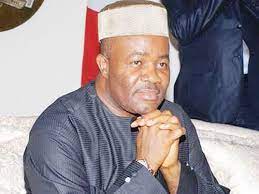News
PANDEF, Others Demand Publication Of NDDC Forensic Report

A coalition of Niger Delta groups has called on the Federal Government to publish the forensic audit report of the Niger Delta Development Commission (NDDC).
They specifically said there should be no sacred cows and secrecy in handling the audit report.
The Niger Delta Affairs Minister, Senator Godswill Akpabio had disclosed last week that the long-awaited report of the audit which started in 2019, had been submitted by a team of auditors.
Akpabio also gave assurance that the document would soon be presented to President Muhammadu Buhari.
The groups, including the Pan-Niger Delta Forum (PANDEF), said at the weekend that every aspect of the report should be made public.
They also challenged the Presidency to muster courage and ensure total transparency in presenting all aspects of the report to the public without fear or favour.
The other groups are Ikwerre People’s Congress (IPC) Worldwide, Itsekiri Liberation Group (ILG), Ndokwa Neku Union (NNU), Urhobo Progressive Union (UPU), and Movement for the Survival of Ijaw Ethnic Nationality in the Niger Delta (MOSIEND).
PANDEF, through its Spokesman, Ken Robinson, expressed concern that the protocols for the presentation of the audit report might cause another delay, all to the detriment of the people of the Niger Delta.
Robinson said, “We might have a situation where they say that they would study it (report), perhaps set up another committee to study it, that’s the way they may go about it. Just to delay it and perpetuate the interim leadership. These will be to the detriment of the people of the Niger Delta.
The IDU Patron, Idu Amadhe, lamented that the forensic audit had been used in the last two years to stall development of the Niger Delta.
He said, “The audit should be done transparently so that all stakeholders will be satisfied. To leave the audit in the hands of someone without making it public is fraudulent, and satanic. Nobody should take the region for a ride.”
Amadhe, therefore, demanded the publication of the full content and raw file of the audit report to enable the whole world and stakeholders to get firsthand knowledge of the true situation of NDDC.
Its Chairman, Livingstone Wechie, added that there should be no sacred cows or exceptions, but total transparency in the entire process.
He said, “It is important to state that the almost irrecoverable undoings in NDDC impacted negatively on the entire region to the benefit of a handful of known political rogues who have robbed the people of the Niger Delta of all development benefits as was originally purposed which precipitated and necessitated the establishment of the commission.”
The ILG Chairman, Mone Oris said that Niger Delta people were eager to know those, including brothers and sisters, who had through their greed, made life difficult in the region.
He noted that since the audit was carried out with public funds, there was no need for the results to be shrouded in secrecy.
Oris said, “If millions of Niger Delta money was spent on the forensic audit, then, it is necessary that without delay, that the report be made public. So, that they would be able to see their sons and daughters, brothers and sisters who have enabled, for the past years, the problem of the Niger Delta region.
“They promised before now that they would make it public. So, they should go ahead and do so. We are tired of the delay because they promised July ending. Now, August is running out, the document is not made public and the board has not been inaugurated. We are seeing foul-play everywhere.”
The President-General of the NNU, General Ndubuisi appealed to Buhari to be courageous and allow stakeholders in the region to know how billions allocated to the region had been spent.
He said, “The forensic audit should be made public, except there is something to hide. Otherwise, I think it should be made public. That is my personal opinion. If a forensic audit is being conducted, then, it should be made public. Except Akpabio lacks the will to do so otherwise the audit should be made public.”
His UPU counterpart, Olorogun Moses Taiga, said, “We want to know those who got money for projects and did not execute them, we expect that the forensic will go as far as revealing which projects were properly executed, which were poorly done and those abandoned and for how much they were awarded.
“The UPU is of the view that the report should be made public because it is public funds. We want to know how much was spent. We believe the report will spell out these details”.
The Pan Ijaw group, MOSIEND, also cast doubts on the audit, saying it lacked transparency.
Its National President, Kennedy Tonjo-West, said many of the communities in the Niger Delta were not covered during the audit.
He demanded that the report be made public so that stakeholders could question the validity or otherwise of the process. .
He said, “Is it that the new board that is coming in will start all over again to do the job they have done? We cannot be satisfied until we read the report being published and then we know the various communities that were captured during their field auditing.”
News
HoS Hails Fubara Over Provision of Accommodation for Permanent Secretaries

News
Allegation of Disrespect to President Tinubu Unfounded — Rivers Government

News
Rivers Government Dismisses Allegations of Disrespect to President Tinubu


